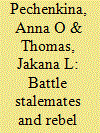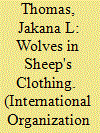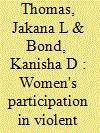| Srl | Item |
| 1 |
ID:
171221


|
|
|
|
|
| Summary/Abstract |
This manuscript examines how battlefield events influence belligerents’ pursuit of negotiated settlements in civil wars. We argue that successive stalemates are most likely to precipitate rebel demands for negotiations because they offer groups both the opportunity and willingness to push for a compromise settlement. Unlike rebel losses, stalemated battles demonstrate that rebels can offer military resistance to the state. Yet, unlike rebel battle gains, draws do not raise the prospects of a rebel war victory. Using monthly data on rebel demands for negotiations and battle outcomes for 63 African dyads fighting between 1997 and 2010, we find support for this argument; more battlefield stalemates decrease the time until a proposal to negotiate by rebels. Additionally, we examine whether the same battlefield dynamics explain the onset of formal negotiations. The results reveal only a relationship between rebel battle gains and the onset of talks. The contrast in these findings suggests that rebels and governments may conceive of battlefield outcomes, especially stalemates, differently. Although rebels perceive a window of opportunity from a battlefield deadlock, governments appear to be influenced most by rebel gains.
|
|
|
|
|
|
|
|
|
|
|
|
|
|
|
|
| 2 |
ID:
179865


|
|
|
|
|
| Summary/Abstract |
Although a substantial body of research argues that women provide terrorist organizations with important tactical benefits, few studies draw out the implications of this argument or examine whether female recruits affect the outcomes of terrorist operations. Using data on individual suicide attacks from 1985 to 2015, I show that an attacker's gender influences the lethality of an attack. However, this effect is conditional upon the gender norms of the state in which the attack occurs. The results demonstrate that a female advantage is more apparent only in societies where a woman's role in public life is limited; attacks by female suicide attackers are more deadly in countries where women are largely absent from the workforce, civil society, and protest organizations. I also assess whether counterterrorists eventually adapt to the use of female suicide terrorists. The results demonstrate that female attack lethality is declining with time, suggesting that security forces eventually adapt to women's participation in terrorism. These findings are consequential because they highlight the effect of persistent gender biases on counterterrorism efforts.
|
|
|
|
|
|
|
|
|
|
|
|
|
|
|
|
| 3 |
ID:
140807


|
|
|
|
|
| Summary/Abstract |
While women have participated in a variety of militarized movements across time and space, the determinants of their participation have not been examined systematically. In this article, we seek to explain variation in women's involvement across different violent political organizations. Our research highlights the role that organizational attributes play in influencing women's presence in violent groups. We evaluate our hypotheses using an original dataset on women's participation in and characteristics of 166 violent political organizations across 19 African countries from 1950 to 2011. Our empirical results show strong support for our argument that organization-based opportunities for women's participation explain whether female members are present in a group.
|
|
|
|
|
|
|
|
|
|
|
|
|
|
|
|